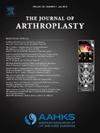选择性全髋关节置换术的风险意识:巴西髋关节协会调查
IF 3.8
2区 医学
Q1 ORTHOPEDICS
引用次数: 0
摘要
背景:随着全髋关节置换术(THA)越来越普遍和广泛,现在的求美者往往具有多种风险因素,这些因素增加了并发症的风险,直接影响了手术费用和医疗服务提供者的报酬。本研究旨在更好地了解这些因素的影响以及巴西髋关节外科医生的看法:方法:邀请巴西髋关节协会(SBQ)的所有 880 名正式会员完成一份关于术前风险因素的在线问卷,该问卷改编自美国髋关节和膝关节外科医生协会(AAHKS)之前的调查。对调查回复数据进行了统计分析:共收到 398 份回复(占 SBQ 成员的 45.2%)。大多数人(81.7%)在复杂性高的医院工作;46%的人有 15 年以上的 THA 经验;30.2% 的人每年进行 100 次以上的 THA(47% 的人每年进行 40-100 次)。总体而言,56.5%的医院根据可改变的风险因素来限制 THA 的资格:76.6% 的受访者认为营养不良,65.8% 的受访者认为糖尿病控制不佳是不允许进行 THA 的因素;大多数受访者(89.2%)建议在减肥手术后等待 6 到 24 个月。尽管 59.5% 的受访者拒绝接受酗酒者,但 80.9% 的受访者愿意为吸烟者手术,75.6% 的受访者愿意为阿片类药物使用者手术。87.2%的受访者认为高龄不是相关因素,71.1%的受访者认为男女风险相同。在限制 THA 手术资格的受访者中,78% 是根据个人经验或文献,32.6% 遵循患者主治医生的意见。90.4%的受访者认为基于风险的补偿将扩大THA的使用范围:结论:与拉丁美洲、亚洲、欧洲和美国的同行相比,SBQ 会员对进行 THA 手术的限制条件的看法基本相似,但他们更愿意为吸烟者进行手术,也更愿意推迟为减肥后患者进行 THA 手术。几乎所有成员都赞成调整外科医生的报酬,将患者的风险因素考虑在内。本文章由计算机程序翻译,如有差异,请以英文原文为准。
Perceived Risk of Elective Total Hip Arthroplasty: A Brazilian Hip Society Survey
Background
As total hip arthroplasty (THA) has become more common and widely available, candidates now often present with multiple risk factors that increase the risk of complications, directly impacting the cost of surgery and provider compensation. The present study was designed to better understand the impact of these factors and the perceptions of hip surgeons in Brazil.
Methods
All 880 full members of the Brazilian Hip Society (SBQ) were invited to complete an online questionnaire on preoperative risk factors, adapted from the previous American Association of Hip and Knee Surgeons survey. Statistical analyses of survey response data were performed.
Results
A total of 398 responses were received (45.2% of SBQ members). Most (81.7%) work in high-complexity hospitals; 46% have more than 15 years of experience in THA; and 30.2% perform more than 100 THAs/year (47% perform 40 to 100/year). Overall, 56.5% restrict THA eligibility based on modifiable risk factors: 76.6% view malnutrition and 65.8% view poorly controlled diabetes as factors precluding THA; most (89.2%) recommend waiting six to 24 months after bariatric surgery. Although 59.5% of respondents turn down candidates who abuse alcohol, 80.9% are willing to operate on smokers and 75.6% on opioid users. Advanced age was not a relevant factor for 87.2, and 71.1% perceive risk as equal in men and women. Among respondents who restrict THA eligibility, 78% do so based on personal experience or literature, while 32.6% follow the opinion of the patient’s primary clinician. 90.4% believe risk-based compensation would expand access to THA.
Conclusions
Compared to their peers in Latin America, Asia, Europe, and the United States, SBQ members have a largely similar perception of restrictions to performing THA, but are more willing to operate on smokers and more likely to defer THA in postbariatric patients. Nearly all favor adjusting surgeon compensation to take patient risk factors into account.
求助全文
通过发布文献求助,成功后即可免费获取论文全文。
去求助
来源期刊

Journal of Arthroplasty
医学-整形外科
CiteScore
7.00
自引率
20.00%
发文量
734
审稿时长
48 days
期刊介绍:
The Journal of Arthroplasty brings together the clinical and scientific foundations for joint replacement. This peer-reviewed journal publishes original research and manuscripts of the highest quality from all areas relating to joint replacement or the treatment of its complications, including those dealing with clinical series and experience, prosthetic design, biomechanics, biomaterials, metallurgy, biologic response to arthroplasty materials in vivo and in vitro.
 求助内容:
求助内容: 应助结果提醒方式:
应助结果提醒方式:


